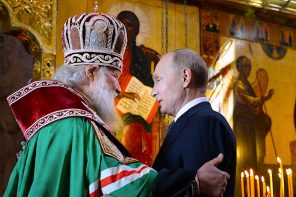An Eastern Orthodox prison inmate won a small but important victory in his legal fight to have the Indiana Department of Corrections recognize his religion. A federal district court has ruled that Dolen W. Glenn, a 52-year-old man from Valparaiso, Ind., can proceed with his case against the IDOC. Glenn is arguing his right to practice his religion has been substantially burdened because the prison system’s handbook of religion does not list Eastern Orthodox Christianity.
According to court documents,
Mr. Glenn alleges that the defendants have violated his First Amendment and (Religious Land Use and Institutionalized Persons Act) rights by failing to have his Eastern Orthodox religion placed in the IDOC Handbook of Religious Belief and Practices (the ‘Handbook’). He also alleges that he has been denied access to Eastern Orthodox services, communion, and confession, and to other religious items such as prayer rope, icons, alter, Bible, Prayer book, cross, prayer rug, candle, incense, holy water, holy oil, holy writing, and kosher food.
Religious items, such as a prayer-rope bracelet, have been taken away from Glenn because the Department of Corrections doesn’t recognize them as religious items. According to prison policy, something can only be deemed a religious item, officially, if it is listed in the IDOC’s Handbook of Religious Belief and Practices. When the prison system transferred Glenn from one facility to another in 2012, a prayer rope was confiscated, along with a clock, cat toys, a hat with nine metals on it, a waste basket, gloves, and a whisk broom.
Glenn sued the IDOC for destroying his property, estimating the damage at $335, but the case was dismissed by the courts.
As Hollis Phelps and Ryne Beddard pointed out here on RD (in reference to a Florida minister arrested for feeding the hungry according to his religious beliefs), the religious right’s religious freedom arguments have been treated far more credibly. Glenn claims that in addition to taking his religious items away, the fact the IDOC doesn’t list Eastern Orthodoxy in its religious handbook has meant no chaplains and no religious services are provided. Glenn claims he has repeatedly requested Eastern Orthodox services since 2010. The Department of Corrections’ Religious Services Director, David Liebel, reportedly told Glenn to be patient.
“Prison staff,” according to Glenn, “do not know what offenders are allowed to have at the prison to practice their religion,” since Eastern Orthodoxy is not listed in the official handbook.
Although the court has only ruled in Glenn’s favor on a preliminary motion, it’s notable for a prisoner free exercise case to get the court’s approval to go forward. Howard Friedman, who tracks prisoners’ free exercise lawsuits on his blog, Religion Clause, notes that since October there have been rulings in 31 of such cases, two-thirds of which were dismissed by the court. Most prisoner free exercise cases involve Muslim inmates, though neo-pagan groups, New Religious Movements, and Native American religions also often find themselves in conflict with prison authorities. Glenn is one of the few Christian inmates to be suing a corrections department and possibly the only Eastern Orthodox inmate to claim his religious rights are being violated.
The Eastern Orthodox account for about 0.6 percent of the American population, according to Pew, roughly equivalent to Jehovah’s Witnesses. According to the pan-Orthodox parish directory, there are 47 Orthodox churches in Indiana, divided by history and ethnic heritage into 10 distinct churches, yet the state’s Department of Corrections handbook has no distinct listing for Eastern Orthodoxy.
Glenn has been in prison since 1992, when he was convicted of sexually molesting a 9-year-old and a 15-year-old boy, making it very unlikely that his case will be championed by religious liberty advocates.
In any case, the court is scheduled to move forward with the case in December.




